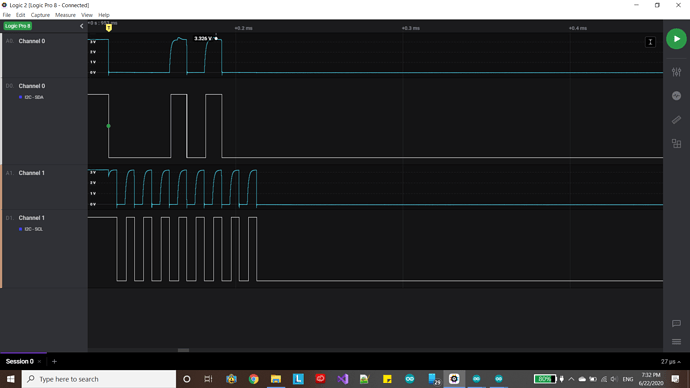Summary:
This seems to be a WIO bug. When WIO is an I2C slave and receives its first transmission from a master it hangs itself and hangs the I2C bus (holds the SCL and SDA low). Tried it with and without 10K pull up resistors but results were the same.
Description:
Ok here is what I did. I ran an Arduino Zero (because it is 3.3v) as a slave and the WIO as a master. I connected it off the backport instead of through the Grove connector (the pins marked I2C1_SDA and I2C_SCL). I also made sure to share the grounds between both boards. Everything worked fine as expected.
I then ran the exact same code with the Zero as a master and the WIO as a slave. The WIO seems to hang and it holds the SDA and SCL lines low. I determined this by using a logic analyzer.
It seems to do this this right in the middle of receiving its first message. I also tried an I2C scan from the Zero to the WIO and it would hang everything as soon as it got to it’s address (0x10);
Master
#include <Wire.h>
int x = 0;
void setup() {
Serial.begin(9600);
while(!Serial);
Serial.println("Starting");
delay(200);
// Start the I2C Bus as Master
Wire.begin();
}
void loop() {
Wire.beginTransmission(0x0A);
Wire.write(x+'0'); // sends x as char
int err = Wire.endTransmission(); // stop transmitting
Serial.println(err);
x=(x+1)%6;
delay(25);
}
Slave
#include <Wire.h>
volatile int x = 0;
volatile bool hit = false;
void setup() {
// I took out Serial prints just to make sure there was no conflict.
//Serial.begin(9600);
//while(!Serial);
Wire.begin(0x0A);
// Attach a function to trigger when something is received.
Wire.onReceive(receiveEvent);
}
void receiveEvent(int bytes) {
hit = true;
x = Wire.read(); // read one character from the I2C
}
void loop() {
//Serial.print(hit);
//Serial.print('\t');
//Serial.println((char)x);
delay(100);
}
Below is the logic analyzer results. I narrowed it down to the part where the WIO is turned on. It literally holds the lines low as you can see.
